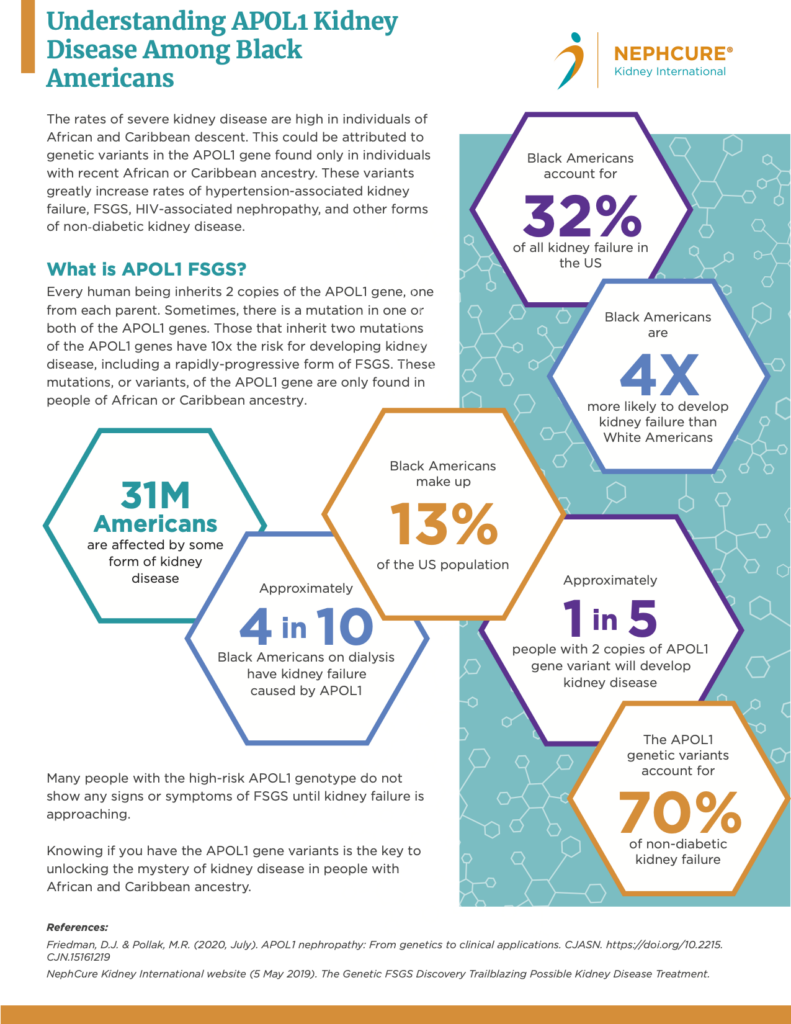Have you or your loved one been diagnosed with FSGS? We have resources for you.
The rates of severe kidney disease are high in individuals who are African American, Hispanic black, Afro-Caribbean, or of African ancestry. This could be due to differences in the genetic makeup in the APOL1 gene found typically in individuals with recent African, Caribbean, or Latin American descent. These differences in the genetic makeup are associated with increased rates of hypertension-associated kidney failure, FSGS, HIV-associated kidney disease, and other forms of nondiabetic kidney disease.
Fast facts about APOL1 FSGS:
- Black Americans account for 32% of all kidney failure in the US
- Black Americans are four times more likely to develop kidney failure than White Americans
- Approximately 4 in 10 Black Americans on dialysis have kidney failure caused by APOL1 gene changes
- Approximately 1 in 5 people with two copies of the APOL1 gene changes will develop kidney disease
- The high-risk APOL1 genotype is present in 75% of Black patients with FSGS
Below are resources we’ve complied that might be useful for you:
This informational flyer on APOL1 FSGS breaks down the basics and helps you better understand this disease.

To download the full informational sheet, click here.
In June 2020, we hosted a NephCure U session specifically on APOL1-Associated FSGS. Dr. Jeffrey Kopp from the NIDDK lead, “Kidney Disease in Patients of African Descent: APOL1-Associated Disease” and discussed more on the diagnosis, treatment options, and clinical trials. Listen in on the hour-long educational webinar below.
NephCure co-hosted a GlomCon Clinical Trial Conference Series session on Advances in APOL1 Therapeutics on February 14, 2021, featuring Dr. Ogo Egbuna, Dr. Opeyemi Olabisi, and Dr. David J. Friedman. Click here to watch the recording of this session.
In addition to these resources, there are also clinical trials available for APOL1-Associated FSGS patients. Clinical trials look at the safety and effectiveness of potential new treatments. The main goals of clinical trials are to find new ways to prevent, detect (find) or treat diseases or health conditions, and to make sure potential new treatments or therapies work well and are safe for people. Check out some pre-screener questions below, provided by Vertex, to see if their clinical trial could be a fit for you or your loved one.
- Eligible participants must meet the following criteria:
- Be male or female adults between the ages of 18 and 65 (inclusive)
- Female participants must not be pregnant or breast-feeding
- Be of African, Caribbean or Latin American descent
- Have had a kidney biopsy which has found focal segmental glomerulosclerosis (FSGS)
- Have not had a diagnosis of kidney disease other than FSGS
- Be willing to complete the investigational apolipoprotein L1 (APOL1) gene test
- Be willing and able to follow the study instructions
To learn more about Vertex’s clinical trial, click here. If you meet the preliminary criteria listed above, find the location closest to you and click the “I’m Interested” button to get in touch with an investigator for additional evaluation of eligibility.
You can find a full list of clinical trials for all protein-spilling kidney diseases on KidneyHealthGateway.com.